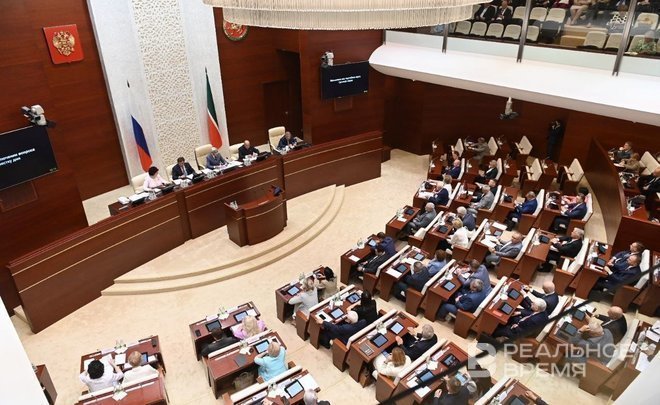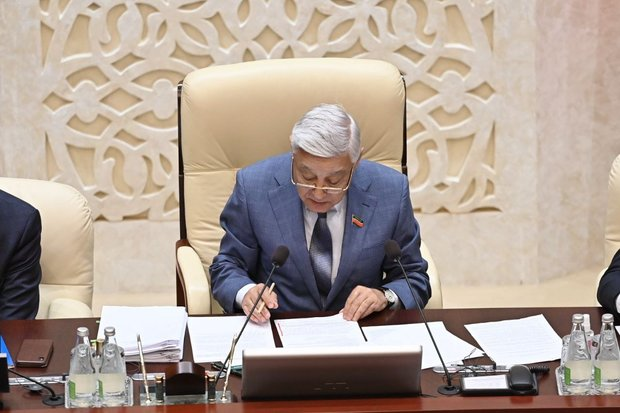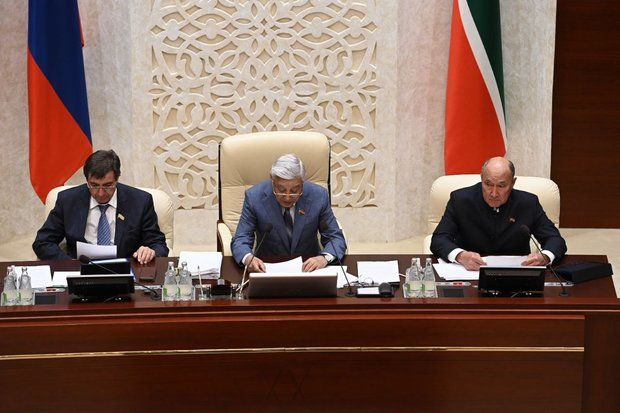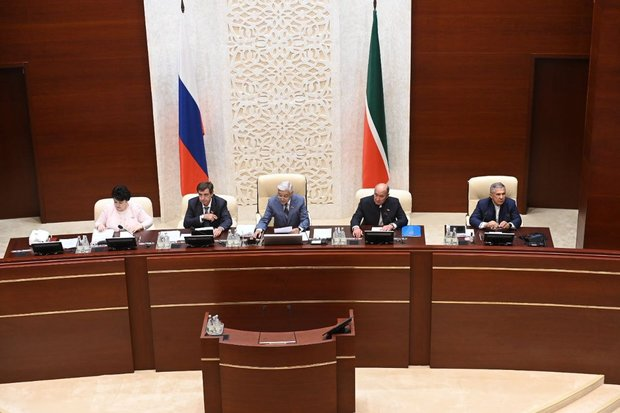‘As a result of novelties, the grey market of transporters will come here too’
Tatarstan deputies debate on taxi prices and the colour for their cars

A high-profile republican bill on taxi prepared according to patterns of the federal law On Transportation of Passengers and Luggage in Passenger Taxi in the Russian Federation was adopted by the Tatarstan State Council. The rules of providing the services will tighten from 1 September: taxi aggregators, transporters and cars themselves must be registered in state registries and the cars must be painted in yellow or white. But at the very beginning of the session, the deputies made the top 3 judges of the Constitutional Council, increased the budget deficit of 2023 to 45.4 billion rubles because of “early funding” from the federal centre. “The second half of the year promises to be more complicated,” difficulties with the replenishment of treasury was predicted at the session, Realnoe Vremya’s correspondent made sure.
“The main task is to strengthen the constitutional law in Tatarstan”
The process of creation of the Tatarstan Constitutional Council was completed at a meeting of the Tatarstan parliament on 13 July. Deputies approved the compositions of the council that must consists of three members — the chair and two deputies. Ex-Chairman of the Tatarstan Supreme Court Ilgiz Gilazov whose candidacy was offered by the rais of the republic led the council. Tatarstan Supreme Court judge Roman Gafarov and 2nd-category judge Elmira Mustafina became his deputies. Their candidacies were approved by the Tatarstan State Council’s Committee for Urban Engineering and Local Governance. All three candidates were elected unanimously.
“To be honest, I invited them too,” Farid Mukhametshin shared details of the appointment. “We discussed how we would work for quite a long time. I told them they were honoured to found the creation of a supreme agency — the Tatarstan Constitutional Council, decide how to fit it in the structure of the republic’s public power agencies and establish relationships. We discussed it all.”

But anyway the floor was also given to would-be members of the Tatarstan Constitutional Council. Tatarstan State Council deputy, Director General of TNV channel Ilshat Aminov asked two candidates about their vision of the task as managers of the council. Judge Roman Gafarov decided to reply.
“The main task is to strengthen the constitutional law in Tatarstan, and all the efforts will be focused on this,” he said laconically from the rostrum.
According to him, the council will deal with organisational issues first, then it will switch to tasks but he didn’t specify what tasks. The Tatarstan Constitutional Council was founded this June, it took up the duties of an abolished constitutional court of the republic, according to requirements of federal legislation. The council is created as a permanently operating public agency according to Article 114.1 of the updated Constitution of Tatarstan approved earlier this year. The republic’s parliament voted for adopting a dedicated bill on 8 June.
All in is fine on the border
Intrigue related to the expansion of the number of deputies working on a permanent basis became known next, the number is now 23. A new “vacant” position was occupied by Myakzyum Salakhov, a member of the Tatarstan State Council’s Committee for Education, Culture, Science and National Affairs. “We backed him given his rich work and life experience. He will work in the same committee he used to,” Farid Mukhametshin said.

Immediately after this, the deputies approved an agreement on the border with Kirov Oblast without discussion. On 2 July, the Tatarstan rais and the governor of Kirov Oblast Alexander Sokolov signed an agreement and put it forth for discussion of the parliament. The talks with this region weren’t easy and took nearly three years. Now the land division issue with Kirov Oblast was sent to the Russian State Register for examination, said Tatarstan Minister of Land and Property Fanil Agliullin. So Tatarstan is completing the work on the definition of borders with regions. “The work required both diplomatic and conflict resolution knowledge,” deputy Rimma Ratnikova noted. The total length of Tatarstan’s border with other regions is 3,400 kilometres. The republic borders eight Russian regions.
Deficit increased ahead of time
An initiative of the Ministry of Finance to double the budget deficit — to 45,4 billion rubles — turned out unexpected. The republic’s budget expenditures increased by 44.8 billion rubles — to 415.9 billion rubles, incomes did by 26 billion rubles, to 370.5 billion, while the budget deficit rose to 45.5 billion rubles. As Tatarstan Finance Minister Radik Gayzatullin said, incomes from oil production are lower this year, however, an income tax rise in industrial, transport and trade enterprises is forecasted to be 15 billion rubles. According to the Tatarstan finance minister, Tatarstan’s own budget expenditure excluding federal money, rose by 40.8 billion rubles. Expenses on new investment projects in particular increased by 7.1 billion, costs on co-financing of measures of national projects did by 6 billion, costs on socially important measures, regional major construction and repair programmes did by 5.1 billion rubles.
Gayzatullin explains revamping was “objective necessity” and assured the audience the deficit of the republican budget was fully provided by sources, Tatarstan doesn’t violate its commitments to the federal centre in debt restructuring in all parameters.
Chairman of the Tatarstan State Council’s Committee for Budget, Taxes and Finances Leonid Yakunin added that despite the ongoing sanctions, the economy of the republic operated stably during the first half of the year. “The second half of the year is expected to be more complicated,” he admitted.

Why change taxi colour?
Minister of Transport and Road Farit Khanifov presented a republican bill on taxi that is due to come into force from 1 September this year. Basic norms are founded in the federal law No.580 on passenger and luggage transportation in passenger taxi in Russia, while the regions must adapt it to local conditions. As it turned out during a discussion, Tatarstan was one of the first 20 regions to introduce regulations and use only three key norms out of 21 envisaged in the federal law. However, the biggest irritation was caused by the obligation to paint a car yellow or white one cannot refuse for some reason.
A federal law on passenger and luggage transportation in passenger taxi will come into force on 1 September this year, Farit Khanifov reminded the audience. The law comprehensively regulates taxi rides, which changes the existing taxi market regulating model. The region’s own project of the bill on taxi was created when bringing republican legislation in line. The main novelty is that not only companies, sole traders but also self-employed people can work in taxi. But they will have to sign agreements with aggregators.

Three registries are going to be created to control market players — aggregators, transporters and cars. The registries will be kept in a federal passenger taxi information system. Moreover, each of the players will have to obtain permit confirming the membership in the state taxi registry. By now the activity of taxi services and their relations with the transporter and the passenger haven’t been regulated legally. The federal law fills this gap. The permit is valid for five years.
Chairman of the Tatarstan State Council’s Committee for Housing Policy and Infrastructure Development Alexander Tygin added that regions had different approaches. For instance, Petersburg and Penza established the colour for the first time and our republic plans to launch testing for drivers to find out their knowledge of infrastructure facilities and engine eco-friendliness class.
“Won’t what we will adopt today lead to a taxi price rise in the future? Is there going to be any hike after our adoption?” deputy Nikolay Rybushkin asked.
Transport Minister Farit Khanifov tried to calm people down and assured them that the rise would be short-term. “We always have period of a rise in the trip and a fall. So during a tourist boom in Kazan, prices go up, then they go down. Prices again rise when it is very cold,” he explained the first reason. According to him, the ministry analysed the price for a taxi ride since 2017 and concluded that there were several reasons here. The second reason is a reduction in the car fleet. “There used to be registered 8,000 cars, now a bit more than 3,500 are left,” he claimed.

The Tatarstan transport minister thinks “as a result of the novelties, the grey market of transporters will come here. How will tariffs respond to this? I think they are going to grow first and then go back to normalcy.”
“They say extra money won’t be needed. But do cars have to be repainted? Cars in some regions aren’t pained. Because there are checks on top and people get used to them. If there is some, it means it is taxi,” deputy of the Communist Party of the Russian Federation Khafiz Mirgalimov was indignant. He was explained that the republic introduced the requirement for taxi colour as early as 2011 and the region is not going to refuse this norm.